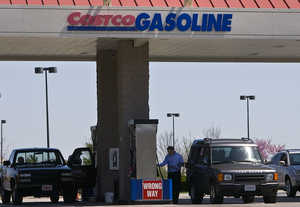 For the first time in the U.S., a gasoline retailer has plans to fix hot fuel.
For the first time in the U.S., a gasoline retailer has plans to fix hot fuel.
Costco Warehouse Inc. has agreed to change its fuel pumps in several states so they compensate customers for the lower energy value of hotter-than-average gas and diesel.
The sale of hot fuel – above the industry standard of 60 degrees – has been estimated to cost U.S. consumers more than $2 billion a year. But drivers in Kansas, Missouri and elsewhere would get their money’s worth under a Costco plan.
Costco’s precedent-setting plan would settle its part of a lawsuit in U.S. District Court in Kansas City, Kan., against oil companies and retailers doing business in several states.
The settlement, which still needs court approval, also would end what had been unanimous opposition by the oil industry and retailers to selling U.S. consumers temperature-adjusted fuel.
Besides agreeing to change its pumps in the hottest regions, Costco promises in states such as Kansas and Missouri not to buy temperature-adjusted fuel wholesale and then sell non-adjusted fuel to customers.
The sale of hot fuel – above the industry standard of 60 degrees – has been estimated to cost U.S. consumers more than $2 billion a year.
Attorneys for the oil companies and their trade group, the American Petroleum Institute, did not return calls seeking comment on the settlement, nor did the Petroleum Marketers Association of America, which represents fuel retailers.
Those groups oppose temperature adjustment at retail and in the past have said that the cost of fixing the problem would simply be passed on to consumers, erasing any benefit to them.
But supporters of temperature-adjusting for consumers say the Costco settlement is a first step to ensuring that people buying gas will get their money’s worth.
In these economic times, every penny saved is a penny earned, Sen. Claire McCaskill, a Missouri Democrat, said Wednesday.
"It is my hope that other companies will follow Costco’s lead and do the right thing to protect the American consumer," she said.
Attorney Bob Horn, co-lead counsel in the hot-fuel suits, said he expected to have discussions with other defendants within a week.
Referring to Costco, Horn said, "We finally have someone stepping up and saying (temperature-adjusted fuel) is right and fair to U.S. consumers."
In a series of stories in 2006, The Kansas City Star estimated that hot fuel cost consumers $2.3 billion annually. That is because, put simply, fuel expands and contracts depending on temperature.
At the longtime industry standard of 60 degrees, the 231-cubic-inch U.S. gallon puts out a certain amount of energy. But fuel is often sold at higher temperatures, causing it to expand and the amount of energy to decline for each gallon dispensed.
At other stages in the fuel-delivery chain, the industry routinely adjusts volume for temperature, using the 60-degree industry standard. In Canada, where colder temperatures tend to keep fuel below the standard, the oil industry has favored retail temperature adjustment and taken in more revenue as a result.
But retail pumps in America give consumers 231 cubic inches per gallon, regardless of temperature.
Costco now wants to change that.
It will change its gas pumps to make the adjustment in the warmest states where it has stores, roughly the bottom half of the country, including California, Texas and Florida – the heaviest users of gasoline. The wholesale fuel that Costco buys in those states is temperature-adjusted.
The settlement deals differently with Missouri, Kansas, Maryland, Indiana, New Jersey, Oregon and Pennsylvania. Costco stores would not be required to make changes to their pumps in those states, where the company doesn’t buy temperature-adjusted fuel at wholesale.
"Hurrah for Costco," said Judy Dugan, research director for Consumer Watchdog, a California public interest group. "Costco has a reputation for consumer friendliness, and frankly this carries that forward."
Dugan said Costco had been under pressure from the oil industry not to settle.
The agreement gives Costco some wiggle room in meeting its terms, especially if the oil industry retaliates by stopping fuel supplies to the chain or raising its price because of the settlement.
The agreement also would not require Costco to have temperature adjustment at retail if it became illegal to do so.
The oil industry is already pushing a proposal at the National Conference on Weights and Measures – which sets model laws for states to follow – to bar temperature adjustment for consumers while continuing it at wholesale.
Costco’s settlement agreement was filed late Wednesday in U.S. District Court in Kansas City, Kan., where dozens of hot-fuel lawsuits were consolidated in 2007. The consolidated suit seeks to become a class action representing millions of consumers.
To reach Steve Everly, call 816-234-4455 or send e-mail to [email protected]







